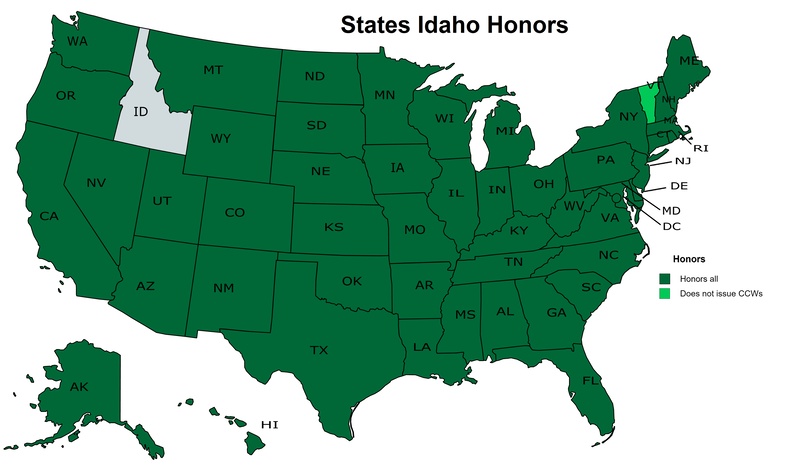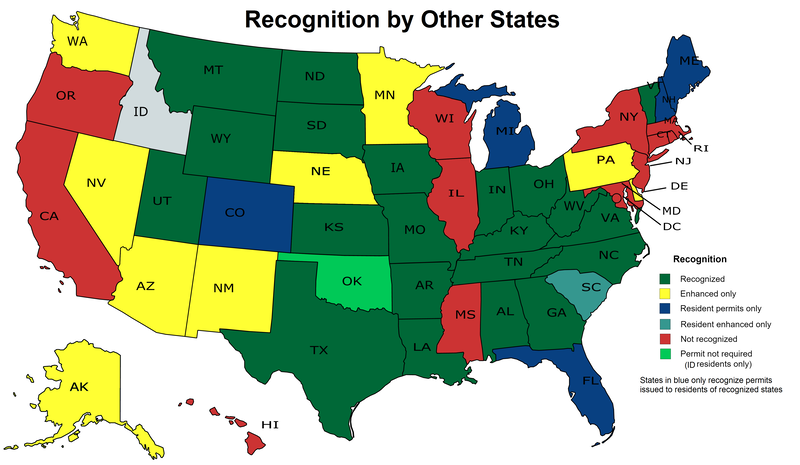Idaho Concealed Carry
"Concealed weapon" means any deadly weapon carried on or about the person in a manner not discernible by ordinary observation. 18-3302(2)(a)
"Printing," where the imprint of your gun shows through your clothing, is not illegal anywhere in the United States.
"Printing," where the imprint of your gun shows through your clothing, is not illegal anywhere in the United States.
What is a loaded firearm?
For a firearm capable of using fixed ammunition, that live ammunition is present in:
Concealed carry requires a permit only within city limits. The exemptions are:
For a firearm capable of using fixed ammunition, that live ammunition is present in:
- The chamber or chambers of the firearm;
- Any internal magazine of the firearm; or
- A detachable magazine inserted in the firearm;
- A propellant charge; and
- A priming cap or primer cap. 18-3302(e)
Concealed carry requires a permit only within city limits. The exemptions are:
- In the person's place of abode or fixed place of business;
- On property in which the person has any ownership or leasehold interest;
- On private property where the person has permission to carry concealed weapons from the owner or lessee;
- Outside the limits of or confines of any city. 18-3302(3)
- Any deadly weapon located in plain view;
- Any lawfully possessed shotgun or rifle;
- A firearm that is not loaded and is concealed in a motor vehicle;
- A firearm that is not loaded and is secured in a case; and
- A firearm that is disassembled or permanently altered such that it is not readily operable. 18-3302(4)
HB 516 of 2020 expands constitutional carry to all US citizens and not just Idaho residents and took effect July 1, 2020. Previously, only Idaho residents were exempt from the permit requirement in cities and towns. This applies to those 18 and up. All US citizens may carry concealed in Idaho without a permit regardless of state of residence.
HB 206 expanded constitutional carry to 18-20 year olds and took effect July 1, 2019. This bill discriminates against non-residents and is not true constitutional carry, which recognizes that the government cannot regulate who can carry a firearm and in what manner. Vermont by contrast, has never had a law that regulates the carry of firearms, which is true constitutional carry. See 18-3302(3)(f).
Idaho residents and vistors may:
Idaho residents and vistors may:
- Carry a concealed handgun without obtaining a concealed weapon license anywhere in the state, including within city limits:
- One can meet the requirements to obtain a concealed weapon license (license not required, but ensuring only law-abiding citizens are granted the exemption).
- Anyone over 18 may carry a concealed weapon inside or outside city limits as long as they can meet the requirements to obtain a concealed weapon license (eff. 07/01/2019).
- Anyone over 18 may obtain a standard concealed weapon license (not the enhanced license and may not be recognized by other states) as long as they can meet the requirements.
Concealed Weapon Licenses
Idaho is a shall issue state. Concealed weapon licenses are issued by county sheriffs. A sheriff cannot ask the applicant to voluntarily submit any information not required by law. There is no duty to inform an officer if carrying concealed, and while there is no law that requires one to present a license if asked, 18-3302(h) and (h) state the license exemption is only valid when in possession of the license. Non-residents carrying on a recognized out-of-state license/permit must be carried by the armed citizen in order for the permit/license to be valid under Idaho law. Licensee/applicant information is not public record. 74-105(6)
Basic Concealed Weapon License (non-enhanced)
This is a basic license to carry a concealed firearm in Idaho authorized by by 18-3302. This does not require specialized training as most states or the enhanced license require. It is available to 18-21 year olds on a may issue basis (19), until July 1, 2016, when it becomes shall issue (see above). Sheriffs have 90 days to issue a license to a qualified applicant (7). A temporary application may be issued for as long as 90 days.
- Is formally charged with a crime punishable by imprisonment for a term exceeding one year;
- Has been adjudicated guilty in any court of a crime punishable by imprisonment for a term exceeding one year;
- Is a fugitive from justice;
- Is an unlawful user of marijuana or any depressant, stimulant or narcotic drug, or any controlled substance;
- Is currently suffering from or has been adjudicated as having suffered from any of the following conditions, based on substantial evidence:
- Lacking mental capacity as defined in section 18-210;
- Mentally ill as defined in section 66-317;
- Gravely disabled as defined in section 66-317; or
- An incapacitated person as defined in section 15-101.
- Has been discharged from the armed forces under dishonorable conditions;
- Has been adjudicated guilty of or received a withheld judgment or suspended sentence for a crime of violence constituting a misdemeanor or a crime that would disqualify him from obtaining a concealed weapons license, unless three years have elapsed since entry of judgment or successful completion of probation prior to the date on which the application is submitted;
- Is an alien illegally in the United States;
- Is a person who having been a citizen of the United States has renounced his or her citizenship;
- Is free on bond or personal recognizance pending trial, appeal or sentencing for a crime which would disqualify him from obtaining a concealed weapons license;
- Is subject to a domestic violence restraining order; or
- Is for any other reason ineligible to own, possess or receive a firearm under the provisions of Idaho or federal law
Training requirements:
Background check
Within five days, the sheriff submit the application and fingerprints to the Idaho state police. The Idaho state police must conduct a national fingerprint-based records check, an inquiry through the NICS and a check of any applicable state database, including a check for any mental health records for conditions or commitments that would disqualify a person from possessing a firearm under state or federal law, and return the results to the sheriff within 60 days. If the applicant is not a United States citizen, an immigration alien query must also be conducted through ICE.
Cost
The cost is $20 for a new license, $15 for a renewal and an extra $10 if renewed between 91 and 180 days after expiration. Additional fees may be charged for fingerprinting, the background check, and printing, usually not to exceed at total cost of $64.
Renewal
Licenses are valid for five years and can be renewed 90 days before expiration and up to 90 days after expiration. Renewal licenses take effect on the day the previous license expires. The issuing sheriff must mail renewal notice 90 days prior to expiration.
- Completion of any hunter education or safety course approved by the department of fish and game or a similar agency of another state;
- Completion of any NRA firearms safety or training course or any NRA hunter education course or any equivalent course;
- Completion of any firearms safety or training course or class available to the general public offered by a law enforcement agency, community college, college, university or private or public institution or organization or firearms training school, utilizing instructors certified by the NRA or the Idaho state police;
- Completion of any law enforcement firearms safety or training course or class offered for security guards, investigators, special deputies, or offered for any division or subdivision of a law enforcement agency or security enforcement agency;
- Evidence of equivalent experience with a firearm through participation in organized shooting competition or military service;
- Is currently licensed to carry concealed weapons pursuant to this section, unless the license has been revoked for cause;
- Completion of any firearms training or safety course or class conducted by a state certified or NRA certified firearms instructor; or
- Other training that the sheriff deems appropriate.
Background check
Within five days, the sheriff submit the application and fingerprints to the Idaho state police. The Idaho state police must conduct a national fingerprint-based records check, an inquiry through the NICS and a check of any applicable state database, including a check for any mental health records for conditions or commitments that would disqualify a person from possessing a firearm under state or federal law, and return the results to the sheriff within 60 days. If the applicant is not a United States citizen, an immigration alien query must also be conducted through ICE.
Cost
The cost is $20 for a new license, $15 for a renewal and an extra $10 if renewed between 91 and 180 days after expiration. Additional fees may be charged for fingerprinting, the background check, and printing, usually not to exceed at total cost of $64.
Renewal
Licenses are valid for five years and can be renewed 90 days before expiration and up to 90 days after expiration. Renewal licenses take effect on the day the previous license expires. The issuing sheriff must mail renewal notice 90 days prior to expiration.
Enhanced Concealed Weapon License

This license and its requirements are substantially similar to the basic license above, however, it requires specialized training that includes legal principles and a live-fire requirement. 18-3302K
Idaho residents: Must have been a legal resident of Idaho for at least six consecutive months before applying.
Non-residents: Must hold a current license or permit to carry concealed firearms issued by your state of residence.
Training
Applicants must have completed within the last 12 months a qualifying handgun course taught by a certified instructor. The course instructor must be certified by the NRA, or by another nationally recognized organization that customarily certifies firearms instructors, as an instructor in personal protection with handguns, or by the Idaho POST council as a firearms instructor.
The course must:
Benefits
Holders of Idaho enhanced licenses gain the ability to carry on college/university campuses and increased reciprocity by other states that standard licensees do not have.
Idaho residents: Must have been a legal resident of Idaho for at least six consecutive months before applying.
Non-residents: Must hold a current license or permit to carry concealed firearms issued by your state of residence.
Training
Applicants must have completed within the last 12 months a qualifying handgun course taught by a certified instructor. The course instructor must be certified by the NRA, or by another nationally recognized organization that customarily certifies firearms instructors, as an instructor in personal protection with handguns, or by the Idaho POST council as a firearms instructor.
The course must:
- Be at least eight hours long;
- Be taught face to face and not by electronic or other means; and
- Include instruction in:
- Idaho law relating to firearms and the use of deadly force;
- The basic concepts of the safe and responsible use of handguns;
- Self-defense principles; and
- Include live fire training including the firing of at least 98 rounds by the student.
Benefits
Holders of Idaho enhanced licenses gain the ability to carry on college/university campuses and increased reciprocity by other states that standard licensees do not have.
Concealed Firearm Permit Reciprocity
Idaho has both standard and enhanced permits. Resident and non-residents permits are recognized differently from state to state. Non-residents carrying on a recognized out-of-state license/permit must be carried by the armed citizen in order for the permit/license to be valid under Idaho law.
Concealed carry is better than open carry because surprise will work to my advantage.
The idea behind this is that an openly carried weapon may make the carrier a primary target of the criminal/terrorist. The concealed carrier would blend in with the crowd, and then draw at when it was to their advantage.
This assumption is generally false in the absence of evidence that an openly carried weapon leads to victimization. Abundant evidence is available that open carry is indeed a deterrent to crime. Concealed carry lacks that deterrent factor. The 'gray man' element, appearing unremarkable and blending in with the crowd, only has application when one may be specifically sought out; such as in the case of a police officer. The desire not to be spotted carrying a firearm or otherwise identified typically comes from the police influence in the concealed carry training world.
The advantage of concealed carry lies in the fact that it may be possible to carry in places where open carriers would be shunned or asked to leave. Legally speaking, the advantage is with open carry, yet due to modern sensitivities, the discreet option of undetected concealed carry would prevent any debates with anti-gunners or objections to having the weapon on private property where the owner/management might prohibit it. Also, given one’s choice of dress or activities, concealed carry may be more appropriate.
The debate is largely a matter of taste and environment. A citizen carrier with anti-gun customers or friends may want to protect themselves without alienating others. Some may feel uncomfortable carrying openly. Whatever the choice, it is a personal one and not to be judged or criticized.
Open carry and concealed carry each have their own unique advantages and disadvantages; neither is inherently superior to the other. Both methods complement each other and allow for flexibility in self-defense.
The idea behind this is that an openly carried weapon may make the carrier a primary target of the criminal/terrorist. The concealed carrier would blend in with the crowd, and then draw at when it was to their advantage.
This assumption is generally false in the absence of evidence that an openly carried weapon leads to victimization. Abundant evidence is available that open carry is indeed a deterrent to crime. Concealed carry lacks that deterrent factor. The 'gray man' element, appearing unremarkable and blending in with the crowd, only has application when one may be specifically sought out; such as in the case of a police officer. The desire not to be spotted carrying a firearm or otherwise identified typically comes from the police influence in the concealed carry training world.
The advantage of concealed carry lies in the fact that it may be possible to carry in places where open carriers would be shunned or asked to leave. Legally speaking, the advantage is with open carry, yet due to modern sensitivities, the discreet option of undetected concealed carry would prevent any debates with anti-gunners or objections to having the weapon on private property where the owner/management might prohibit it. Also, given one’s choice of dress or activities, concealed carry may be more appropriate.
The debate is largely a matter of taste and environment. A citizen carrier with anti-gun customers or friends may want to protect themselves without alienating others. Some may feel uncomfortable carrying openly. Whatever the choice, it is a personal one and not to be judged or criticized.
Open carry and concealed carry each have their own unique advantages and disadvantages; neither is inherently superior to the other. Both methods complement each other and allow for flexibility in self-defense.




